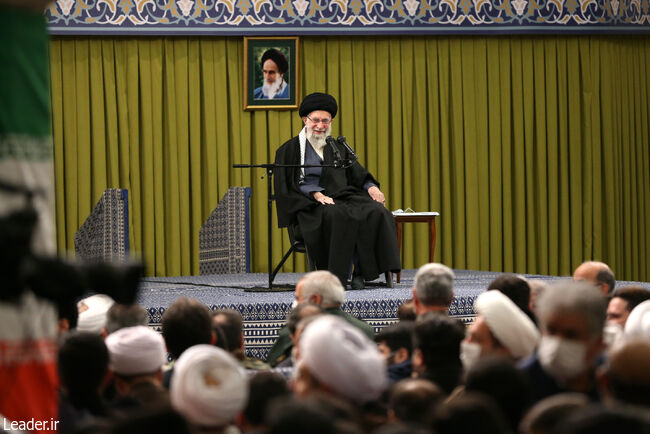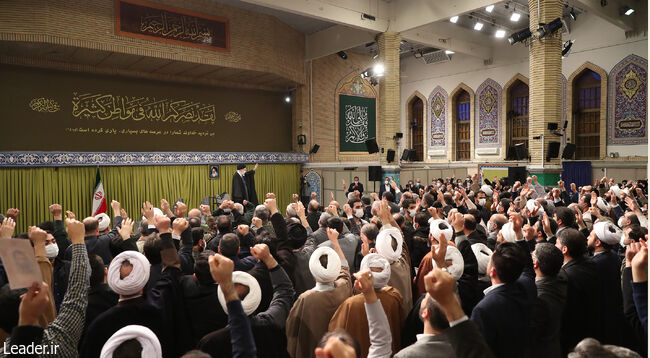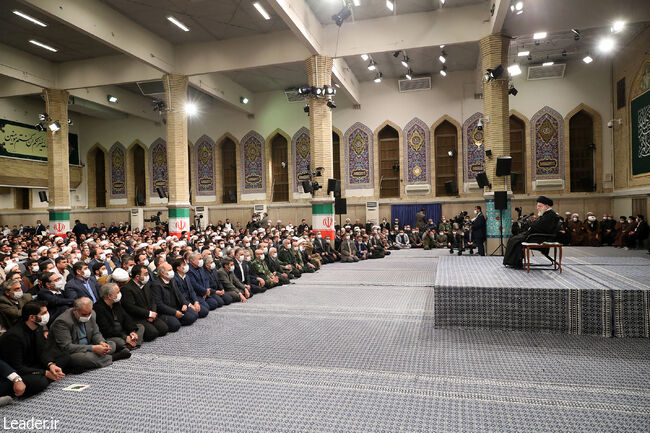Ayatollah Khamenei this morning (Wednesday), in a meeting with thousands of people of East Azerbaijan, called the people of Azerbaijan the standard-bearers of the unity and freedom of Iran and by bowing to the great nation of Iran for the creation of the historical 22nd of Bahman this year, he emphasized: This real, passionate and meaningful epic is the result of the nation's persistence in the way of revolution, and this way of progress and authority, with national unity and with a revolutionary and not a conservative approach to problems, meaning relying on the effort that brought about the achievements, will continue, and the Jihadi and 24-hour effort of all officials for economic growth and the treatment of difficulties, especially inflation will be its foundation.
In explaining aspects of the nation's valuable movement on the 22nd of Bahman, the Leader of the Revolution pointed to the "noisy propaganda of the enemies, the problems that the people feel from their hearts, the cold weather and other factors that reduce motivation" and said: Faithful and insightful people from all across Iran, from east to west and from north to south, ignored these issues and came together, making their voices heard by everyone in a way that only Allah can give real thanks to this great national movement.
He called the nation's historic Saturday march an example of the continuity of national endurance, and referring to the gradual deviations from the main path of movement in the revolutions, he said: Even in the Islamic Revolution, some people had issues with the straight path of the revolution for various reasons, leading to their work going against the principles and ideals of the revolution.
Ayatollah Khamenei added: Contrary to these elements, the nation continued the straight path without feeling any fatigue and despair and without fear of the enemy's blows, threats and attacks, preserving its identity, personality and greatness; and in this path, on the 22nd of Bahman of this year, they came to the streets of the whole country, motivated by various reasons, and demonstrated their meaningful perseverance and resistance against the indocile enemy.
The Leader of the revolution reminded the efforts of the enemy, as well as certain elements inside, to weaken the determination of the nation and make them forget the path of the revolution, and said: One of the important goals of the autumn riots was to make the people forget the 22nd of Bahman, which some followed internally with weak arguments and false words in the newspapers and cyberspace, but of course, the people made them failed.
People attending with their own analysis of the situation was one of the characteristics of the glorious march of the 22nd of Bahman, which the Leader of the revolution praised.
He said: It was clear from people's interviews that they came to the march with their own analysis of the situation, and because they understood that the U.S was afraid of their presence, they showed their full support for the Islamic Revolution and the Islamic Republic system, with enthusiasm and motivation, and with themed slogans.
Ayatollah Khamenei added: The American and Zionist media empire is attempting to impede this voice from reaching the ears of other nations, yet those who ought to hear it, that is, the policy-making bodies in America and England and the enemy's spy services, must have already heard this voice.
The Leader of the revolution pointed to the propaganda uproar in cyberspace and enemy media on the eve of the 22nd of Bahman and said: There were opposing voices that these media tried to magnify, but the voice and cry of the nation ultimately prevailed over all other voices.
"Explaining the lies and weakness of the enemies' claims about the Islamic Republic" was another part of the revolution Leader's speech.
He said: Sometimes they blatantly lie and say that the system is regressing, while the country, despite its problems, is completely different from two or three decades ago and has progressed a lot. Sometimes they also say that the Islamic Republic has reached a dead end; If this claim were valid, the nation would have already collapsed on its own accord, so why do they spend so much effort trying to bring it down?
Ayatollah Khamenei, referring to the enemy's frequent attacks and doubts about the necessity of Iran having military power, said: First of all, a country that has so many enemies must think about itself and its nation, as at the beginning of the revolution, when I found out that some people wanted to sell F-14 fighter jets, I quickly interviewed and disclosed, and that plot ultimately failed.
The Leader of the Revolution emphasized: Based on reason and Sharia, we have paid full attention to defence aspects, and, in accordance with the Quran, we will continue to strive to further progress in this field in the future.
In the same context, he added: The country has worked and invested in other fields, including industry, infrastructural affairs such as road construction and dam construction, and other fields, many times more than defence affairs, but the enemy, which is clearly afraid of Iran's drones based on its propaganda, has chosen to focus on defence issues while downplaying other areas of development.
In summing up this part of his speech, the Leader of the revolution said: By Allah's grace, the nation has not and will not pay attention to the temptations of ill-wishers, and it knows that any progress and movement to strengthen Iran will enrage the enemies, who should be told to "die from this anger and rage" according to the noble verse.
Ayatollah Khamenei called the country's progress an encouraging and admirable reality and noted: Of course, although we are weak in Publicity and media work and have not yet achieved the necessary skills to show these advances, visitors to Iran's exhibitions or achievements are still surprised to see these levels of progress, despite the conditions of sanctions, just as a few years ago, the Zionist missile commander admitted that he was an enemy of Iran, but had to take his hat off to the production of such an advanced missile by Iranian scientists.
Ayatollah Khamenei did not consider the emphasis on progress to mean denying weaknesses and said: There are many weaknesses and deficiencies in the country due to various reasons, some of which are noticeable to the people, such as high prices, inflation, and devaluation of the national currency, and there are also weaknesses in other sectors, such as administrative sectors, but there are two ways of looking at these weaknesses.
The Leader of the Islamic Revolution added: The first perspective or approach is that by looking at the achievements, we can understand that with the same effort that we have achieved these advances, we can also remove the weaknesses, which is a "revolutionary perspective".
In explaining the other point of view, which he interpreted as a "reactionist perspective", he said: With a reactionist perspective of the weaknesses, it is concluded that there is no use in doing anything and nothing can be done, so we have to sit on our hands or complain and raise the weaknesses out loud and even deny the principle of the revolution and the Islamic Republic as some do.
By raising the question, "if a nation has a weakness, should it deny its achievements?" And "which nation does not have weaknesses?" He pointed out the existence of important weaknesses in the large and advanced countries of the world, such as America, England and France, in the field of poverty, disease, discrimination and lack of social justice, and added: In these countries, there are several times more weaknesses than in Iran, but the solution to overcome the disadvantages is not to destroy the principles and roots; rather, the correct approach is to overcome the weaknesses based on a revolutionary perspective.
Referring to the country's achievement of unbelievable progress, the Leader of the revolution noted: At the beginning of the revolution, achieving progress such as the production of tens of millions of tons of steel seemed inconceivable, but such achievements were made with the efforts of the people, young people and the excellent officials we had, and these efforts still exist to this day.
He called economic growth and curbing inflation the most important tasks; and emphasizing that everyone, especially the officials, is obliged to work and follow up around the clock; he said: Economic affairs are the most important tasks of today because the country cannot progress without economic growth, and economic development requires stability and control of inflation and price stability. The problem of inflation is also treatable, and the officials of different departments should take action.
Ayatollah Khamenei, in addition to the officials, considered different strata of people, including students, professors, religious scholars, manual workers, tradespeople, and livestock farmers, capable of playing a role in various fields, and added: A political activist can also play a role, although political activity is not about sitting around and finding a weakness in the government or other institutions and mocking and exaggerating it in cyberspace, rather political activity involves describing the political environment of the world and the region and explaining the goals of enemies and the orientations of friends.
He listed social and service activities as other areas of effective role-playing of people and noted: Many times, we have been able to overcome significant weaknesses through the people, an example of which was the case of Corona and the role people played by piously aiding others [scheme]. Also, the people's enthusiasm and presence in uplifting social activities support the country and ensure its progress.
The Leader of the revolution called "national unity" another effective factor in the country's strength and emphasized: Of course, difference of opinion exists, but there should not be a conflict on minor issues. Debates and arguments in Hawzahs (Islamic Seminaries) and universities and in the public media are beneficial if they are accompanied by respect for others, but conflict and enmity and using inappropriate language are not good.
He considered the general tendency of the Iranian nation as revolutionary and added: There are some people in the country whose opinions on some political issues are against the views of the general public and officials, but they are not the enemy of the Iranian nation; the enemy of the Iranian nation is arrogance, and everyone should be wary not to help arrogance and not become its tool against Islam and dear Iran.
Ayatollah Khamenei called the future as bright as ever and said: Whenever there is a bright horizon ahead of us, we have been able to attain it after a while thanks to the immense capabilities and capacities of our nation, and thus this nation will continue to achieve even greater successes in the future.
During this meeting, Ayatollah Khamenei praised the faith, zeal and purity of the people of Tabriz and Azerbaijan and considered the 29th of Bahman Uprising of the people of Tabriz to be "a defining moment and the turning point in the history of Iran" and said: If the people of Tabriz had not stood up in the fortieth of the uprising of the people of Qom, that important uprising would have been forgotten; but by transforming the incident of Qom into an uprising and a national movement that led to the overthrow of the dependent authoritarian regime in less than a year, the people of Tabriz took the flag of Iran's freedom in their hands and created a historical moment.
He considered the despotic government's action of bringing tanks to the streets of Tabriz to suppress the people and scholars as a sign of the regime's incompetence and said: The zealous people of Tabriz were not even afraid of the tanks, and by standing up and sacrificing their blood and life, they created a huge movement, a feat that has many other precedents in the history of Azerbaijan.
The Leader of the revolution considered the movement of the Azerbaijanis, including the people of Tabriz and Ardabil, at the beginning of the Safavid era as the basis for saving Iran from division and feudalism and added: That historic movement united Iran and gave it independence and unified it; therefore the flag of Iran's unity is also in the hands of Azerbaijanis.
He called the accurate narration of the history of Azerbaijan one of the duties of scholars and the narrative of an important part of Iran's history and said: The people of this region have continually demonstrated their strength of faith and fortitude, from their involvement in the Constitutional Revolution and the tobacco-related cases to their presence with insight and perseverance in the victory of the revolution, the holy defence, and the events of the following decades, as well as in these more recent cases.
Ayatollah Khamenei called Azerbaijan the centre of civilization and culture of the western part of the country in terms of culture, and referring to the renowned cultural figures of this region, he said: The great services of these names to the literature and culture of the country cannot be counted.
According to these records, the Leader of the revolution considered Tabriz's uprising on the 29th of Bahman 1356 (18th of February, 1978) as an identity-building event that should be learned from to walk the bright path of the future.
At the beginning of this meeting, Hujjat al-Islam wal muslimin Ale-Hashem, the representative of the Leader in East Azerbaijan province, considered effective and continuous communication with the elites and youth, pursuing the solution of economic activists' problems, direct presence among the people, and cultural and political confrontation with secular and separatist currents, among the measures of representation of the Leader in the province.



